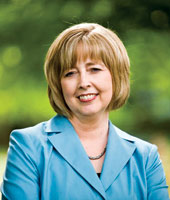 |
|
Spring 2007 | Volume 30, Number 1
| From the Editor
|
|
|
Google Alert: Biblical Literacy in
the National Spotlight
 This issue of Response was almost complete when the first “Google Alert” crossed the screen. Newsweek had featured a new book by a Boston University professor, Stephen Prothero. The title? Religious Literacy: What Every American Needs to Know and Doesn’t(HarperSanFrancisco, 2007). This issue of Response was almost complete when the first “Google Alert” crossed the screen. Newsweek had featured a new book by a Boston University professor, Stephen Prothero. The title? Religious Literacy: What Every American Needs to Know and Doesn’t(HarperSanFrancisco, 2007).
We were surprised — first, that a major book about a subject so similar to ours debuted at this particular moment and,
second, that a national magazine chose to give it so much attention. But that was just the beginning. From there, the story spread like wildfire: USA Today, US News and World Report, The Christian Science Monitor, and other national publications reported Americans’ failing grade in religion. Dailies from New York to Seattle published religious literacy quizzes and probed the conse-quences of the nation’s ignorance. Prothero even guest-starred on “The Daily Show
with Jon Stewart.”
Perhaps the most stunning discovery of all was Time magazine’s April 2 cover story: “Why We Should Teach The Bible In Public School (But very, very carefully).” We knew there was a growing body of research, and
a corresponding level of concern among many people, about the sad state of biblical literacy in America — but a topic of national discussion? It was an unexpected, and welcome, turn of events. Such a serious discussion of the Bible could only be a good thing.
The subject of biblical literacy is the entree into this issue of Response, but in a context ultimately different from that explored by the national press. We asked a variety of national Christian leaders the question, “Why does biblical literacy matter?” and their answers took us from the historical and cultural reasons why knowledge of the Bible is important, to the Bible’s raison d’etre: the instruction, correction, and nourishment of the church.
This, of course, is why we first chose to focus on the Bible in Response. As a university with a commitment to “becoming biblically and theologically educated” and to addressing the issue of biblical illiteracy in our culture, Seattle Pacific places the Bible at the center of its work. So we invited four SPU faculty members, a leading New Testament scholar, alumni working as Bible translators — even children in a local Sunday school — to help us explore the meaning of the grand story, God’s story, the Bible in the world around us.
A Bible knowledge quiz may tell us how many facts we do or don’t know, but what
is the real measure of biblical literacy? I like
the definition given us by Earl Palmer,
senior pastor at Seattle’s University Presbyterian Church. He says it is “the presence
of a day-by-day friendship with the text.” I hope you’ll be inspired to begin — or renew — such a friendship by something you see or read in these pages. And I hope you’ll be challenged in new ways to engage the culture with the word of God.

JENNIFER JOHNSON GILNETT
|
|
 |
 |

|
 |
from the president
Embracing the Christian Story
SPU President Philip Eaton asks what would happen if the Bible were at the center of the learning enterprise.
campus
Destination: Asia
SPU President Philip Eaton joined a historic delegation of U.S. university presidents that visited Asia.
alumni
Coffee as Change Agent?
Pura Vida employees, including several SPU alumni, engage the culture using a social-venture business model.
books, film, & music
Dark Alphabet
Jennifer Maier, poet and SPU associate professor of English, receives a literary award for her first book.
athletics
National Tournament Returns
For the first time in 10 years, SPU hosts the USA Gymnastics Women's Collegiate Championship.
my response
Undone by the Word
Response writer Kathy Henning shares her journey to know the Bible better.
Response art
Pink Emperors
Class of 1973 alumna Jill Ingram introduces Response readers to “Pink Emperors.”
|
 |
|
 |